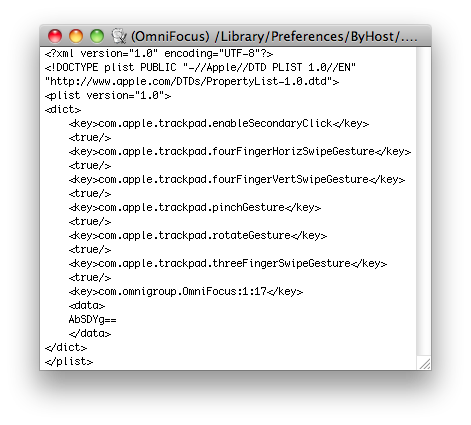Home » Industry Watch » The Technological » Hall of Monkeys
Omni Group & OmniFocusAn intrusion and an invasion.
How would you like it if you found out that your dinner guests were hiding things all about your house behind your back? For whatever reason? You wouldn't be happy. Those dinner guests would no longer be your friends and they'd never be invited back to dinner again.
Shareware is tricky shit. Shareware is invited into your computer. But for a limited time only. Most shareware users are honest. 95% of them. They will pay for something they really like. Those other 5% could be a problem. But there are things like that happening in all industries. The main thing is to not alienate the 95% in your zeal to get at the 5%.
Shareware likes to strictly limit its trial period, and therein the quandary. Most shareware titles make a feeble effort to enforce it but little more. Some software vendors go further. Too far.
Such as Cocktail. Where the author got into a shouting match at old Version Tracker about leaving 'remnants' on the host system. He didn't leave hidden files, said the egregious programmer, he left remnants. Upon which the original poster naturally asked him 'remnants - WTF are remnants?' Upon which Mr Cocktail bit him off with 'if you don't know what data remnants are, then you're too ignorant to have a discussion!'
Tough words. Here you have a software vendor who starts by giving you an app entirely for free, then sneaks an update on you which - if you don't read the fine print and most didn't - is suddenly time-limited and costs money if you want to keep using it. And the time limit is strictly enforced by a 'data remnant'.
Rixstep of course discovered what that 'data remnant' was. Rixstep's Tracker can always discover all of that today. Nothing gets by it. The technique used was reminiscent of that used by Opera Software for their browser on Windows. Yet another rude invasion and intrusion.
What Opera did - what the nastiest of them do - is hide those 'data remnants' in somebody else's file. It's particularly nasty work - and particularly dangerous as well. For if a software vendor is going to go behind your back for something like that; if your personal integrity means so little to them: then what else are they capable of doing?
Opera Software hid their trial period data in the core Windows settings file WIN.INI under the entry name 'WinZip'. There was no mention of Opera at all.
That could have backfired for any number of reasons. And may have too. But they didn't care. They actually tried to bluff people with the story that their software 'burned' a deep level signature on the hard drive and the only way to remove it was to completely wipe the disk and reinstall everything.
Obviously that's not the way to do business. And if people find out you're up to tricks like that, they most likely won't ever be keen to do business with you again.
Which segues right into Omni Group and OmniFocus.
Omni Group & OmniFocus
Omni Group are one of the original NeXTie startups. Their corporate name and their software have been mentioned in many places in official Apple documentation. They're supposed to be some of the 'good guys'.
Their remake of their NeXT web browser didn't fare well; they had to scrap their own rendering engine because it was so buggy; they made a big fanfare out of adopting Apple's WebKit as if they were doing Apple some kind of favour; and so it's gone for the company from (of all places) Seattle WA.
They still have a number of standalone titles available, including OmniFocus. OmniFocus comes with a 14 day trial.

What happens at the end of that 14 day period? What happens if you still aren't sure you want to purchase OmniFocus?
OmniFocus isn't cheap.

$80 is a serious chunk of change for a single app that's only supposed to improve your workflow. Suppose you need more time? Suppose you've been away from home on business and you didn't get to test the app properly? Your trial period ran out; so what do you do now? Download again?
Will it work?
Odds are it won't. For Omni Group are pulling the same stunt as Cocktail, the same stunt as Opera. And it's hard to see what they do - even with Tracker. And without Tracker you don't have a chance. Omni Group are hiding things on your computer - they're trying to fool you - and you'd be very lucky indeed to guess where they've gone to ground.
~/Library/Preferences/ByHost
Omni Group hide their dirty little secret in your ~/Library/Preferences/ByHost directory. In the one file they're fairly certain will always be there - its name always begins with .GlobalPreferences, just like the one in the parent directory, but after that it's got a 12-digit hex number and finally the file extension plist.
That file is most likely stored in 'binary XML' format, meaning it'll look like gibberish if you try to open it with (for example) a text editor. But you could try one of Apple's tools on it, or you could try Rixstep's PlistEdit, and then you'd discover (especially in the latter case) that it's just an ordinary UTF-8 text file for property list preferences.
And then what you find at the tail end of the file could look something like this.

See Also
Radsoft Software Reviews: The Opera Mafia
Rixstep Software Reviews: The Bad: OmniWeb 5.0
Rixstep Software Reviews: The Very Ugly: OmniWeb 5.9.2 (free)
Rixstep Software Reviews: The Very Ugly: OmniWeb 5.1.3 beta 1
|